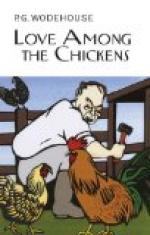There was one solitary gleam of variety in our menu. An editor sent me a cheque for a set of verses. We cashed that cheque and trooped round the town in a body, laying out the money. We bought a leg of mutton, and a tongue and sardines, and pine-apple chunks, and potted meat, and many other noble things, and had a perfect banquet. Mrs. Beale, with the scenario of a smile on her face, the first that she had worn in these days of stress, brought in the joint, and uncovered it with an air.
“Thank God!” said Ukridge, as he began to carve.
It was the first time I had ever heard him say a grace, and if ever an occasion merited such a deviation from habit, this occasion did.
After that we relapsed into routine again.
Deprived of physical labour, with the exception of golf and bathing— trivial sports compared with work in the fowl-run at its hardest—I tried to make up for it by working at my novel.
It refused to materialise.
The only progress I achieved was with my villain.
I drew him from the professor, and made him a blackmailer. He had several other social defects, but that was his profession. That was the thing he did really well.
It was on one of the many occasions on which I had sat in my room, pen in hand, through the whole of a lovely afternoon, with no better result than a slight headache, that I bethought me of that little paradise on the Ware Cliff, hung over the sea and backed by green woods. I had not been there for some time, owing principally to an entirely erroneous idea that I could do more solid work sitting in a straight hard chair at a table than lying on soft turf with the sea wind in my eyes.
But now the desire to visit that little clearing again drove me from my room. In the drawing-room below the gramophone was dealing brassily with “Mister Blackman.” Outside the sun was just thinking of setting. The Ware Cliff was the best medicine for me. What does Kipling say?
“And soon you will find that the
sun and the wind
And the Djinn of the
Garden, too,
Have lightened the hump, Cameelious
Hump,
The Hump that is black
and blue.”
His instructions include digging with a hoe and a shovel also, but I could omit that. The sun and the wind were what I needed.
I took the upper road. In certain moods I preferred it to the path along the cliff. I walked fast. The exercise was soothing.
To reach my favourite clearing I had to take to the fields on the left, and strike down hill in the direction of the sea. I hurried down the narrow path.
I broke into the clearing at a jog trot, and stood panting. And at the same moment, looking cool and beautiful in her white dress, Phyllis entered in from the other side. Phyllis—without the professor.
CHAPTER XVII
OF A SENTIMENTAL NATURE




